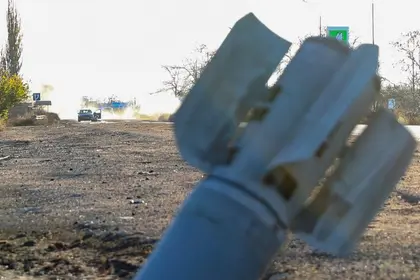Kremlin’s Latest Mass Missile Attack Underwhelms
Russia on Monday launched upwards of 100 cruise missiles in a mass attack intended to demolish Ukraine’s power grid, but damage appeared less extensive than the last time the Kremlin tried, officials said.
Ukraine’s civil defense network was quick to warn of the incoming missiles, following initial reports at 12:25 Kyiv time of Tu-95 bombers launching munitions over the Caspian Sea. A nationwide air raid warning went into effect minutes later. Russia’s previous mass missile strike on Ukraine, on Nov. 15, left most cities without power for 48 to 60 hours.
Well before the missiles struck on Monday, Ukraine’s air defense command reported 104 bomber-launched cruise missiles and 16 warship-launched cruise missiles inbound. The first missiles, according to official statements, crossed into Ukrainian air space at 13:29. Authorities announced all clear at 16:10.
As the missiles approached, a Kyiv Post reporter in the city center observed a general sang-froid among the inhabitants and life going on much as normal. No one even blinked on the streets as pedestrians carried on negotiating icy pavements on their way to or from lunch. In one cafe the staff just checked their phones when the air raid sirens went off and then carried on chatting and laughing among themselves.
The capital Kyiv was initially attacked by two waves of four missiles each. Some districts of the capital lost electricity temporarily, Kyiv Post staff reported.

NATO, Ukraine to Meet Tuesday Over Russian Missile Strike
Two people were killed and three injured by missile strikes in Zaporizhzhia, the UNIAN news agency reported.
Among the worst-hit cities was Odesa, news reports said. Social media showed smoke following a strike on one of the city’s heating plants, as well as a substation outside the city, in the village of Myrne, on fire. All water pumping stations and reserve power lines were damaged in the Odesa strikes, the UNIAN news agency reported. All the city’s heating plants were switched off pending return of power and water, a statement from the Odesa city utility company Teplosnabzhenie Odesa said.
Debris from one missile hit the border district of Briceni in northern Moldova, near Ukraine’s Khmelnitsky region, local news agencies reported. Images showed the engine stage of an S-300 interceptor missile lying in an orchard. On Nov. 15 a Ukrainian S-300 fired at an incoming missile had landed in a Polish border village, killing two.
Sporadic blackouts were reported across Moldova following the strikes. The country is tightly linked to the Ukrainian power grid. Inside Ukraine, substantial sections of the cities Zhytomyr and Sumy also lost power, and along with Odesa most users lost internet service, the tracking site netblocks.org reported.
Partial or temporary blackouts were also reported in the Cherkassy, Vinnytsia, Kryvy Rih, Lviv, Ternopil and Mykolaiv regions, in some cases due to hits to the power grid and in others because of regional switch-offs to prevent grid overloads, news reports said. In Lviv Maksym Kozytsky, head of the regional defense administration, issued a statement saying that social media reports of missile impacts in the region were simply wrong, although power service might be interrupted because of grid damage elsewhere.
The Russian military seemingly attempted to complicate Ukrainian air defense command’s efforts to protect air space on Monday by launching attacks from multiple directions, including from ships in the Black Sea and from Tu-22M3 bombers over the Sea of Azov. Some missiles reportedly took indirect flight paths via Ukraine’s central or western regions en route to targets further north. In the Kharkiv region, military authorities said Russian electronic warfare units attempted to jam Ukrainian air defense units.
The Kremlin on Monday also departed from past tactics of firing a single, one-time massed strike, by launching three separate waves of missiles. Mykolaiv regional defense head Vitaly Kim said the Russian missiles came in three waves. The last Russian missiles departed from bombers over the Caspian Sea at 14:30, an hour after the initial launches.
Ukrainian air defense units using anti-aircraft missiles, fighter jets vectored to intercept, and ground crews operating heavy machine guns and auto-cannon engaged the low-flying Russian missiles across the country.
In the eastern Kharkiv sector, air defense gunners claimed six missiles shot down. Missiles were also reportedly knocked down in Vynnitsia, Poltava, Zaporizhzhia, Dnipro, and Bila Tserkva. Engagements were also reported around Sumy and Kremenchuk. Following the Nov 15. strikes, Ukraine’s air defense command claimed it shot down 77 of more than 90 missiles fired.
Kim credited Ukrainian fighter pilots for multiple kills in the southern sector. “Our pilots are performing miracles. We believe in the Armed Forces of Ukraine (AFU),” he said. At least three missiles were shot down in Mykolaiv air space, according to him.
Ukrainian interceptors also knocked down at least two missiles en route to targets in Kyiv, capital news reports said.
Ukrainian social media delivered updates on the strikes in near real time. The first images of a missile shoot-down, from the Kharkiv region, was widely available to internet users at 14:00, less than 20 minutes after the first wave of Russian missiles had come under fire from local air defenses. In the Vinnytsia region, social media users tracked an incoming missile, and posted images of it, all the way to a shoot-down.
The Dec. 5 1994 anniversary of the Budapest Memorandum – an agreement in which Ukraine gave up its nuclear weapons in return for the Kremlin’s guarantees to respect Ukrainian territorial integrity and to renounce use of military force against Ukraine – was, in the wake of the Monday strikes, widely reported in Ukrainian media.
You can also highlight the text and press Ctrl + Enter






